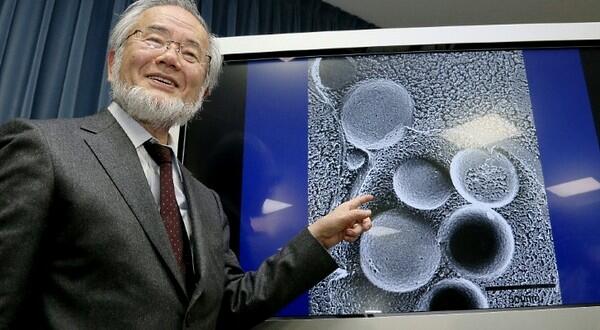Autophagy, the little-understood method by which human cells dispose of harmful waste and unwelcome intruders, may one day be central to therapies for longer, healthier living, experts said.
Japanese cell biologist Yoshinori Ohsumi was awarded the 2016 Nobel Medicine Prize Monday for discovering genes involved in autophagy, a non-stop housecleaning process that keeps cells healthy, and is thought to spur ageing and disease when disrupted.
Scientists are striving to “find a way to increase it beyond what it normally does,” said University of Edinburgh cell biologist Simon Wilkinson referring to future treatment possibilities for cancer and neurodegenerative diseases such as Alzheimer’s or Parkinson’s.
“Can we find drugs that will ramp it up further than it would ordinarily be?” he told AFP by phone. “Can we ameliorate these horrible disorders?”
Trial drugs in lab experiments with human cells and mice have shown that autophagy can indeed be boosted.
In “mouse models, for example, where autophagy has been increased genetically, the mice do age better,” Wilkinson said.
Concretely, this meant a less rapid accumulation of damaged proteins in cells, and a metabolism with a slower rate of age-related decline.
Autophagy — from the Greek words for “self” and “to eat” — is a process by which cells in animals and plants get rid of damaged proteins, as well as specialized structures called organelles which have become defunct.
Allowed to accumulate, these useless scraps would damage the cell and upset its normal functioning, leading to health problems.
Autophagy was already known to scientists in the 1960s, but Ohsumi, who studied the process in yeast in the 1990s, was the first to uncover the genes responsible.
Yeast is a favorite of biologists because it shares much of its cell structure and functioning with humans and other animals.
No Drug in Sight
Autophagy happens when fatty membranes called autophagosomes envelop the unwanted waste and sequester it from the rest of the cell.
The autophagosomes then join up with another specialized cell compartment full of digestive enzymes, called a vacuole, to obliterate the waste.
“Autophagy declines when we age. That’s why we accumulate these dysfunctional proteins that cause diseases,” University of Warwick autophagy expert Ioannis Nezis told AFP.
Source: AFP











